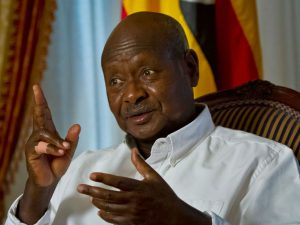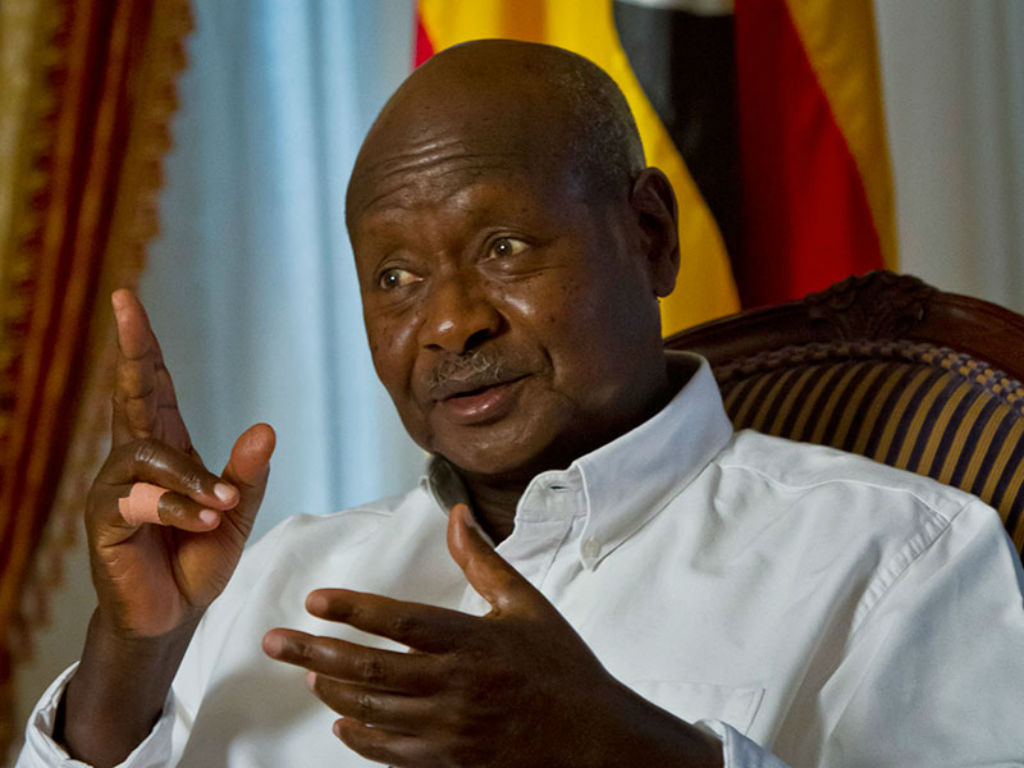
By James Moises*
Kampala, July 27, 2013 (SSNA) — I closely monitor South Sudan’s security, political, and economic developments because it was a big part of my job as a former insider who worked for one of Uganda’s most secret organizations. After I left my former employer here in Kampala, I have been experiencing constant change brought about by the past actions that I carried out against the wills of my brothers and sisters in South Sudan. I have sensitive documents that will show to the world that my president, Museveni, has South Sudanese blood on his hands and he is protecting billions of dollars for both relatives and operatives of the South Sudanese president, including secret deals that were signed between the two presidents.
The Ugandan President Yoweri Museveni has gained unwanted attention in the political stadium of the Republic of South Sudan. Museveni, son of a cattle-keeper, was born in south-western Uganda. The president of Uganda rules our nation with an iron fist and has recently managed to lend his niggling leadership ideology to President Salva Kiir of South Sudan.
The relationship between Kiir of South Sudan and Museveni of Uganda has reached an unparalleled level: the two men talk at least once a day, earning them the nickname “The East African Lions,” a name only known to their trusted insiders (I was one of the Ugandan insiders). But what I am concerned about is whether or not Salva Kiir knows he is dealing with an experienced dictator who can manipulate and slay with a smile on his face. Maybe the South Sudanese leader likes the way my president is running his country because he may have been influenced by Museveni’s success in ruling Uganda for more than twenty seven years.
The current political crisis in South Sudan started with a five-member team secretly handpicked by the South Sudanese president in October 2011. The men were not well-known to South Sudan, let alone the political leaders of South Sudan. All the team members were called “presidential private secretaries.” They were told to do exactly what the president of South Sudan wanted them to do because “the risks were high.” Then, in late October of the same year, the leader of the so-called “presidential private secretaries” on South Sudanese side was told by President Kiir to prepare for a serious meeting with an unidentified contact, a Ugandan by nationality. During the discussion, Kiir went into details describing the plan as the “big project” that must be managed behind the scene, no matter what it takes.
In the first week of November 2011, the meeting took place in an office located north-west of the State House of the Republic of Uganda. The meeting involved two Ugandan security agents and the five men selected by Kiir. A similar plan developed by South Sudan’s president to use Ethiopia as a secret location to deal with peripheral threats was also initiated. Nevertheless, the request was denied by the former Ethiopian Prime Minister, Meles Zenawi, citing an aversion. The idea almost cripples the bi-lateral relationship between Juba and Addis Ababa but the relationship of the two countries was later normalized after Kiir agreed not to repeat such a controversial request ever again. This is just a foretaste of Museveni’s long evil act against the freedom of the people of South Sudan.
Museveni’s involvement in dirty political tricks is not new; the man has been caught red-handed before by the United Nations (UN) investigation commission, which was mandated by the UN Security Council to investigate his link with a Congolese rebel movement, the M23. The UN found that Museveni supported the rebels through his brother called General Salim Saleh, who is best known in Uganda as a “scandal-prone sibling.” The evidences provided by the United Nations (UN) showed that Museveni provided financial, military, and intelligence support to the ruthless, eastern rebel movement. Museveni’s interest in toppling a foreign government has been described as a “fantasy” by both his rivals and critics.
As a former insider, I know that the ‘Juba-Kampala plan’ helped Kiir in some areas of his political wishes, but the plan itself caused many problems in South Sudan, for example, it is inciting tribalism and threatening the new nation to collapse.
The president of Uganda is already a suspicious man in South Sudan. In July 2005, South Sudanese charismatic leader, Dr. John Garang, died in a mysterious Ugandan presidential helicopter crash. Many South Sudanese also suspected that George Athor, a former rebel leader fighting against Kiir’s regime, was not killed in South Sudan as the Juba alleged. Instead, they believe that Athor was killed in Kampala by Juba’s agents who were accommodated by Museveni’s private security branch. They then transported his body to South Sudan to stage the act.
Museveni is known in the international arena as a staunch supporter of South Sudan. In the past, he publicly expressed his dissatisfaction with Khartoum’s treatment of the South Sudanese. But his unwavering support of South Sudan should not be taken as a sign of good friendship between the two countries.
Here in Kampala alone, South Sudanese who have links with Juba’s regime have bought houses worth hundreds of millions of dollars. Some of the people who bought houses are ordinary people who have no jobs, but received huge financial support from Juba through Museveni’s close aids. I have documents of financial agreements, land donation, network of underground corruption, and expensive properties owned by President Kiir and some of the people in his inner circle. I am prepared to expose documents that will directly link Museveni to the grim crisis that is now brewing in the Republic of South Sudan.
The South Sudanese are not Ugandans
South Sudan has over 63 different tribes who speak different languages. These people are known for their diversity, hardwork, courage, hospitality, and many other unique cultural norms. The idea that a plan created by a Ugandan dictator can succeed in South Sudan is absurd. Yoweri Museveni must first study the people of South Sudan, and only then can he be sure of what to do. The South Sudanese are brave people and are afraid of no man. Therefore, dictator Museveni, who established himself as the teacher of a Kiir in Africa’s newest nation, must be exposed.
President Museveni recently sent Uganda’s soldiers into South Sudan to help Kiir deal with the ongoing political crisis. These army personals are now in Juba assemble in north-western side of Juba, some 57 Km away from Juba. The other division is stationed in South of Juba, a distance of about 81 Km. South Sudan National intelligence Agency must check out these locations to verify these evidences. Believe me; you will be stunned when you reach in those locations. The international community and South Sudanese must know that the Ugandan president is the one who gave all these ill-guidance to Kiir and he is now assisting him with covert military assistance intended to kill anyone who oppose Kiir’s leadership. South Sudan national army, SPLA, must be vigilance about Ugandans who are now living in South Sudan.
The world, and the South Sudan in particular, must know that the Ugandan president is not an expert in any good governance; he is only an expert in dictatorship. I want the good people of South Sudan to understand that Museveni is an experienced killer here in Uganda, and you must tell him to stay out of your home dealings or else your nation will be another Somalia in our beloved Africa. The people of Uganda are your brothers and sisters; please do not see us in the image of our long-time dictator, Museveni.
James Moises is a former national security agent in the government of Uganda and has extensive knowledge of the covert security deals signed between Kampala and Juba. He can be reached at [email protected]


3 Comments. Leave new
[…] In July 2013, about four months before South Sudan civil war broke out; he wrote an article exposing Ugandan President Yoweri Museveni meddling in South Sudan internal affairs. His piece caused panic in the entire East African region and around the world and widely credited fo… […]
[…] who is widely credited for exposing Uganda’s involvement in South Sudan’s civil war, criticized the West for what he described as “what we want first, regardless of the amount of […]
[…] who is widely credited for exposingUganda’s involvement in South Sudan’s civil war, criticized the West for what he described as […]